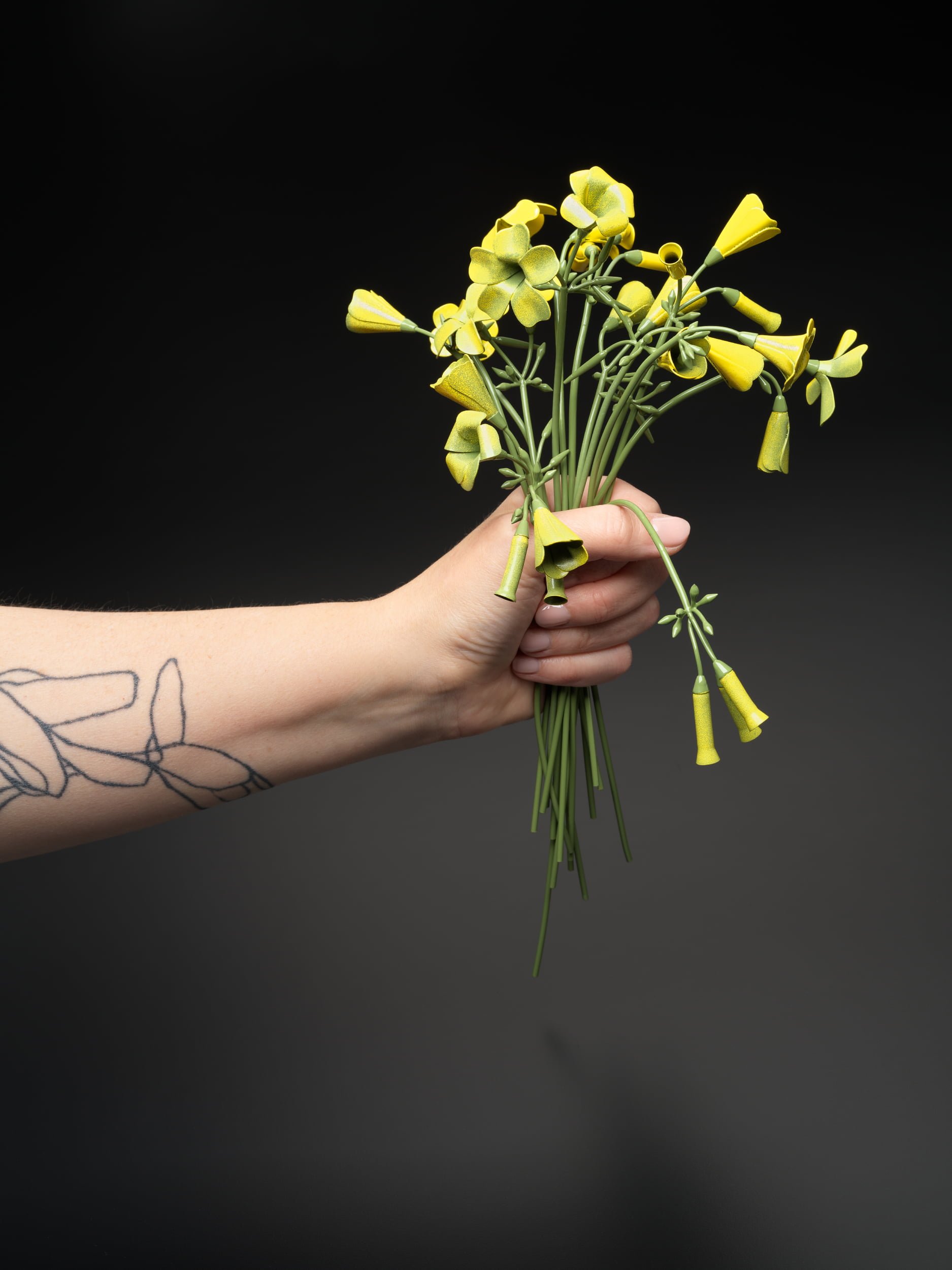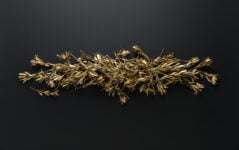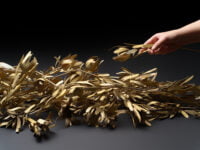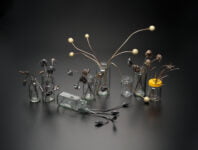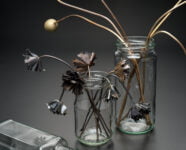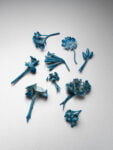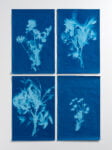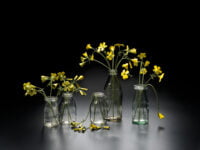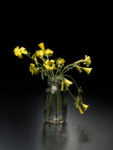A Handful of Flowers…
In 'A Handful of Flowers', Jess Dare draws on her long interest in plant forms to explore the ways in which we use flowers as offerings to mark both the smallest and the most profound moments of our lives. In a sense, this exhibition is a kind of emotional chronicle of her own life. It brings her earliest and most joyful childhood memories of picking flowers together with the pleasure of receiving them as offerings from her own child. But it also draws on the sombre associations flowers have played in her adult experiences of grief and loss, events that are both universal and irreducibly raw and particular.
At the heart of the work is the labour invested in its making, a labour of love, certainly, but a labour that is also analogous to the hard work of grief and mourning. The fact that this work is installed in a space which is both a gallery and someone’s home is also significant: Jess treats it as a liminal space, somewhere between the private place where the emotional work of love and loss so often comes about and the outside world, the public terrain in which these profound human experiences are invested with social meaning.
'Sweet Reminder' runs like a spine through the gallery. Here Jess lovingly replicates the bright yellow weeds so common in South Australia’s early spring landscape. Loved by children for their bright colour and long tender stems that make them so easy to pick, they feature in generations of dreamy childhood games and bunches of flowers picked by children for their Mum.
Jess presents them to us leaning and drooping untidily in jam jars and milk bottles as though they have been transported from someone’s cubby house or a kitchen windowsill. Her elevation of a humble weed puts process at the service of memory. Through her painstaking shaping, soldering, colouring and re-colouring, she must anatomise them, recalling their vegetal forms to her conscious mind. In so doing, she enters a state of mindful reverie, which is perhaps the closest we can come as adults to the immediacy and present-ness of childhood games and pastimes.
Whenever Jess picks her daughter up from an afternoon spent with her grandmother, Olive is waiting with a posy she has picked from the garden. Children’s posies are ephemeral things, charged with the immediacy of a child’s engagement with the world, so that when Olive offers Jess her little bunch of flowers she is gifting her a trace of what it was to be a child for a little time in her grandmother’s garden, immersed and fully present in the moment.
Olive’s posy is an artless gift to her mother. But for Jess, such a gift is freighted with an anxious awareness of how easily such small moments are forgotten, an anxiety she seeks to allay by reproducing her daughter’s little gifts in a variety of ways. She resorts to sun printing, a primitive form of camera-less photography, laying the posies on photosensitive paper in sunlight to create a direct trace of the original flowers, freezing the specific moment when the sun hit them at a particular angle. She remakes their abbreviated clusters as brooches as well. But these are not simple copies of the flowers themselves; rather, she eschews their natural colours and cloaks them instead in shades of blue and grey that replicate the colours of the sun prints, fusing the object of memory with its photographic trace.
In the gallery, she hangs the sun prints at the height that Olive would hang them on her bedroom wall or on the fridge. The brooches, on the other hand, are disposed above the prints at adult height. The sun prints, memory traces of a child’s afternoon in the garden, are grouped like an undercurrent of memory along the wall, but they can only be fully perceived by adults if they stoop to Olive’s height. In the act of bending to look at the sun prints and standing to see the posy brooches, the adult viewer physically embodies the poignant condition of memory: that we cannot return to our pasts, we can only re-imagine them from our vantage point in the present.
In 'Unspoken' and 'Graveside', Jess addresses the ways in which flowers have been central to our rituals of death. Nothing seems so alive as a flower in full bloom and yet its very evanescence speaks to death’s inevitable finality. Jess turns her eye, not to the perfection of floral tributes in their first bloom, but to the action of time upon them. In Unspoken, she painstakingly fabricates a pile of leucadendrons as they begin to collapse in upon themselves, settling into the earth. She leaves them uncoloured, all the marks of their making – the solder joins, the discolorations made by her annealing torch – left in full view, attesting to the fact that they have, in her own words “gone through the weather of my making”. In doing so she draws an analogy between the duration of time involved in making them and the duration of grief itself. Each lovingly shaped leaf and carefully soldered join forges a temporal space in which memory can occur, or acts as an atonement for words left unspoken and rifts left unhealed.
'Unspoken' is the first thing we encounter when we enter the gallery and as such it frames everything else we see, casting its shadow over the childhood idyll of 'Sweet Reminder' and lending a premonitory freight of sadness to the sun print series and Posy Brooches. It seems fitting then that the last work we encounter, 'Graveside', is installed in the bedroom, a private sanctum and also the place where people lie down to sleep and to dream.
There is an elegiac quality to her exploration of floral offerings at gravesites, which are so often informal posies from a private garden. Once again, Jess’s interest here is not in the living perfection of flowers but in the action of time and weather upon their forms. She takes flowers from her own garden – coreopsis, billy buttons, native iris and lavender – remaking them as skeletal remnants, arranged in a ramshackle collection of jars like the ones she has observed on graves in cemeteries.
Such makeshift arrangements always seem at odds with the formality of the language of graveyards and gravesites: the assorted jars that once held pickles or jam seem strangely incongruous yet touchingly intimate in the way in which they bring the domestic world into the public spaces of grief. Here Jess reverses the exchange, returning the jars of withered flowers to the domestic space, where the dreaming minds of the sleepers in this room might bring their shadowy forms together with their flourishing counterparts in the living spaces of the gallery.
Anne Brennan
Printed catalogue available
Exhibition catalogue
